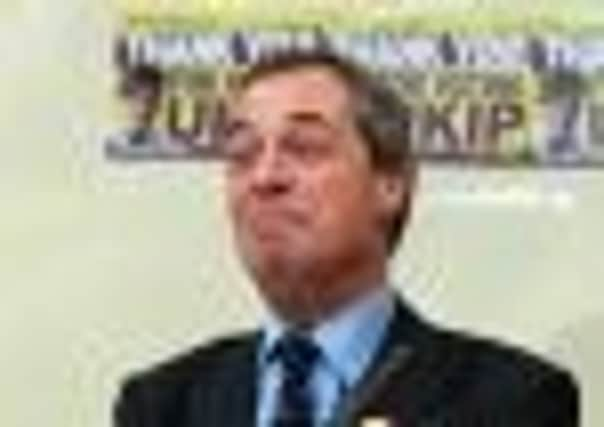Euan McColm: Making plans for Nigel


DIANE James can surely be forgiven her moment of hyperbole. The UK Independence Party candidate in the Eastleigh by-election had come within fewer than 2,000 votes of winning the seat left vacant by the resignation of Chris Huhne, awaiting sentence for perverting the course of justice as he sought to avoid a driving ban. The Liberal Democrats might have held the seat in the end but James was excited.
The result – which saw an increase in UKIP’s vote in the constituency of 672 per cent and the Tories pushed into third place – represented, she said, a “seismic shift” in British politics.
Advertisement
Hide AdAdvertisement
Hide AdWhether a UKIP loss in a by-election is earth-shaking or not is debatable, but James’s party leader, Nigel Farage, was certain of one thing. “Something is changing,” he said. “People are sick and tired of having three social democrat parties that are frankly indistinguishable from each other.”
Mainstream parties quickly wrote off UKIP’s remarkable result as the effect of protest. But privately, leaders of the three main UK parties – and the SNP – are less dismissive of UKIP’s chances of making electoral progress at both Westminster and Holyrood. They admit that immigration is an issue with voter-purchase that they have failed to address.
On camera, Prime Minister David Cameron brave-faced it. “It is a disappointing result for the Conservative Party, but it is clear that, in mid-term by-elections, people want to register a protest,” he said. “But I am confident that at the general election we can win those people back by demonstrating that we are delivering for everyone who wants to work hard and wants to get on.” There would be no shift right to address the success of UKIP, he added.
But Tory MPs were not united behind this message. The party’s vice-chairman Michael Fabricant tweeted: “The Conservative voice is muffled and not crisp. It does not clearly project Conservative core policies or principles.” And “UKIP appealed to protest voters but also to Blue Collar Conservative voters”.
Eleanor Laing and Douglas Carswell were among others who questioned whether the Tories are the right course. Carswell wondered why the party is on a “long march of defeat”.
The PM may claim this was a protest, but others in the party clearly see UKIP as a threat. Farage and company played a minor role in the 2010 election, and even then Cameron could not secure an overall majority. UKIP polling in double figures would kill off Tory hopes in a number of marginals upon which the PM would depend for an outright election victory.
But while focus, after Eastleigh, might fall naturally on UKIP’s potential impact on Westminster politics, the party is turning its attentions to Scotand.
Just a fortnight ago, Farage was ridiculed when he visited Scotland to try to sell the UKIP message. He dismissed Deputy First Minister Nicola Sturgeon as “grossly out of her depth” in the argument over whether an independent Scotland would be an EU member. Not only that, but Farage described the SNP’s campaign for Scottish independence as “dead in the water”.
Advertisement
Hide AdAdvertisement
Hide AdIt was a typically flamboyant set piece from Farage, whose forceful personality has kept UKIP afloat over years of party infighting and scandals ranging from expenses irregularities to accusations of racism and homophobia against officials and elected members.
A Nationalist spokesman snorted that Farage’s comments were not only wrong but irrelevant. “Mr Farage and his colleagues have never moved beyond the far fringes of Scottish Politics,” he added.
The day after UKIP came so close to an upset in Eastleigh, the party’s Scottish chairman Mike Scott-Hayward – a former Tory councillor in Fife – rejects that accusation.
“We might not have won seats in Holyrood or Westminster, yet, but the party’s making real progress in Scotland. Just over a year ago, we were registering a couple of per cent, but we’ve all seen polling that puts us up at 9 per cent, ahead of the Lib Dems.
“If we can get up to 11 per cent by the 2016 Holyrood election, then we’ll see UKIP MSPs. We’ve jumped from 2 to 9 per cent in a year. We don’t have much further to go and we haven’t even started the fight yet.”
There may be a “chattering classes” rejection of UKIP, says Scott-Hayward, but the party is hitting on issues that interest “real people”. Scots care about issues around immigration and EU influence as much as English voters do, he insists, regardless of a narrative that describes his party as “Little Englanders”.
Perhaps surprisingly, Scott-Hayward’s claim is given some credibility by opponents. A veteran Scottish Labour staffer admits: “We all do the focus groups and a striking thing is how perception of UKIP and the issues it focuses on are not necessarily seen as extreme or particularly right wing by people across the board.
“Mainstream political parties can’t ignore that. Voters aren’t all party members and that means they’ll happily float around and sometimes people form views on different issues that can seem bizarre, side by side. When we talk about immigration in focus groups, people have strong views. They’re our voters, and SNP voters and they think we should have been better on these issues down the years.”
Advertisement
Hide AdAdvertisement
Hide AdA Lib Dem source agrees: “Life would be easier if they didn’t, but a lot of people can be all signed up to the social justice that we talk about and still agree with UKIP on immigration. That’s voters for you.”
On Friday, Farage said the Eastleigh result “entirely changes the public perception of UKIP”. His party had been subjected to attacks by a media driven by political agendas, while the other parties would “not hesitate to club together to attack.” That UKIP had done so well in the face of this hostility was evidence that people no longer see a vote for UKIP as a wasted vote.